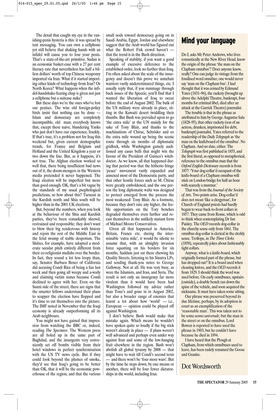Mind your language
Do I, asks Mr Peter Andrews, who lives romantically at the New River Head, know the origin of the phrase ‘the man on the Clapham omnibus’? Does anyone know, really? One can judge its vintage from the fossilised word omnibus; one would never say ‘man on the Clapham bus’. I had thought that it was coined by Edmund Yates (1831–96), the rackety (brought up above the Adelphi Theatre, bankrupt, four months for criminal libel, died after an attack at the Garrick Theatre) journalist.
The trouble is that in the phrase as attributed to him by George Augustus Sala (1828–95), that other rackety (son of an actress, drunken, imprisoned for debt, bankrupt) journalist, Yates referred to the readership of the Daily Telegraph as ‘the man on the knifeboard of the omnibus’. No Clapham. And no date, either. The Telegraph was first published in 1855, and the first literal, as opposed to metaphorical, reference to the omnibus man that the Oxford English Dictionary records is from 1857: ‘Your dog-collar’d occupant of the knife-board of a Clapham omnibus will stick on London-bridge for half an hour with scarcely a murmur.’ That was from the Journal of the Society of Arts. Two points arise. Dog-collar’d does not mean ‘like a clergyman’, for Church of England priests had hardly begun to wear back-to-front collars in 1857. They came from Rome, which is odd to think when contemplating Dr Ian Paisley. The OED records dog-collar in the churchy sense only from 1861. The omnibus dog-collar is clerical in the clerkly sense. Trollope, in The Three Clerks (1858), repeatedly jokes about fashionably tight collars.
Anyway, what is a knife-board, which originally formed part of the phrase, but has dropped out? It is a board used when cleaning knives, and the OED records it from 1829. I should think the word was used before. On early omnibuses, upstairs (outside), a double bench ran down the spine of the vehicle, and soon acquired the nickname. It must have taken some sitting.
Our phrase was preserved beyond its due lifetime, perhaps, by its adoption in court as an exemplification of the ‘reasonable man’. This was taken not to be some uomo universale, but the man in the street or on the omnibus. Lord Bowen is reported to have used the phrase in 1903, but he couldn’t have because he died in 1894.
I have heard that the Plough at Clapham, from which omnibuses used to leave, has been rudely renamed the Goose and Granite.
Dot Wordsworth















































 Previous page
Previous page